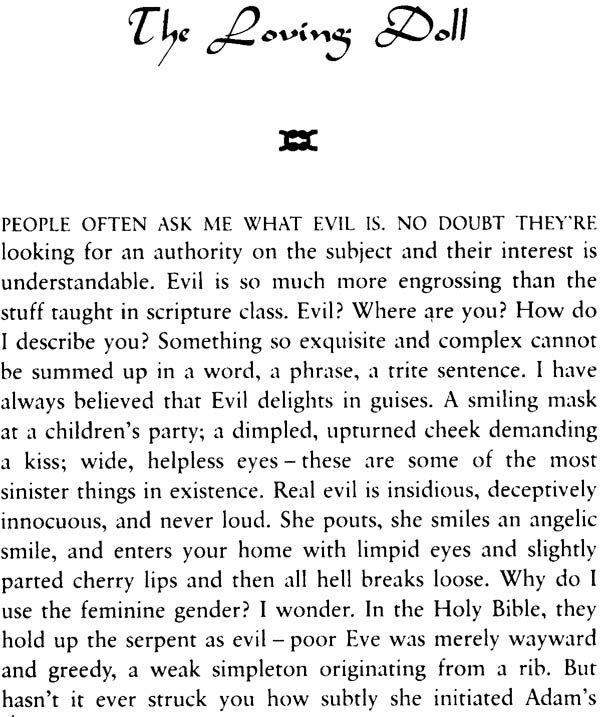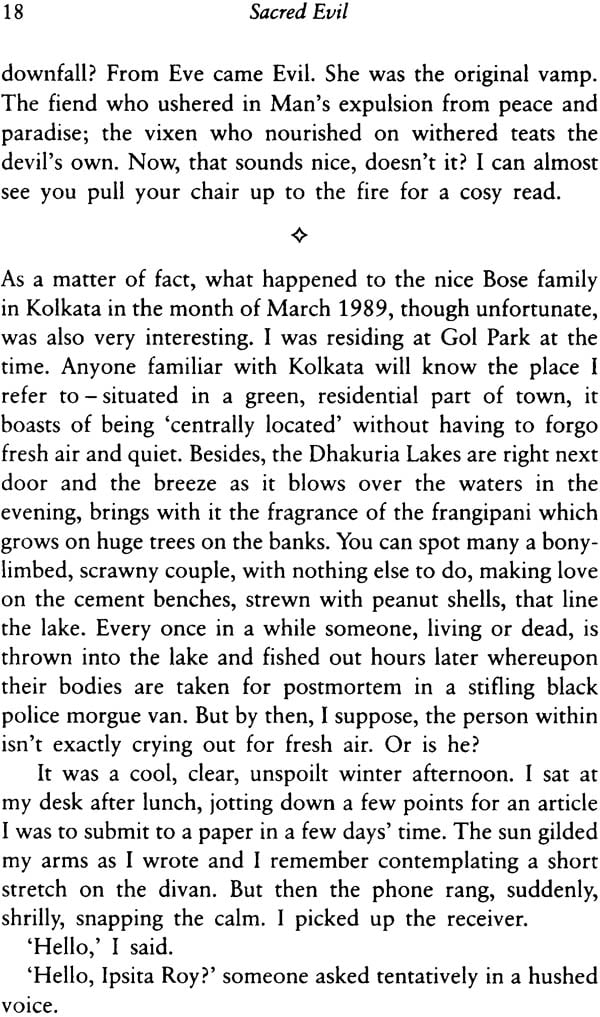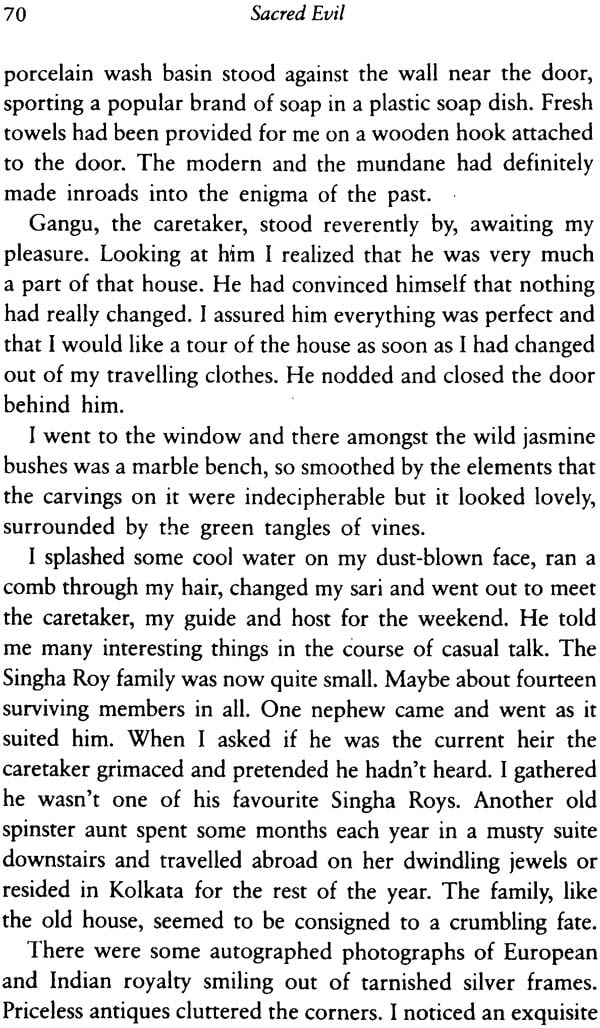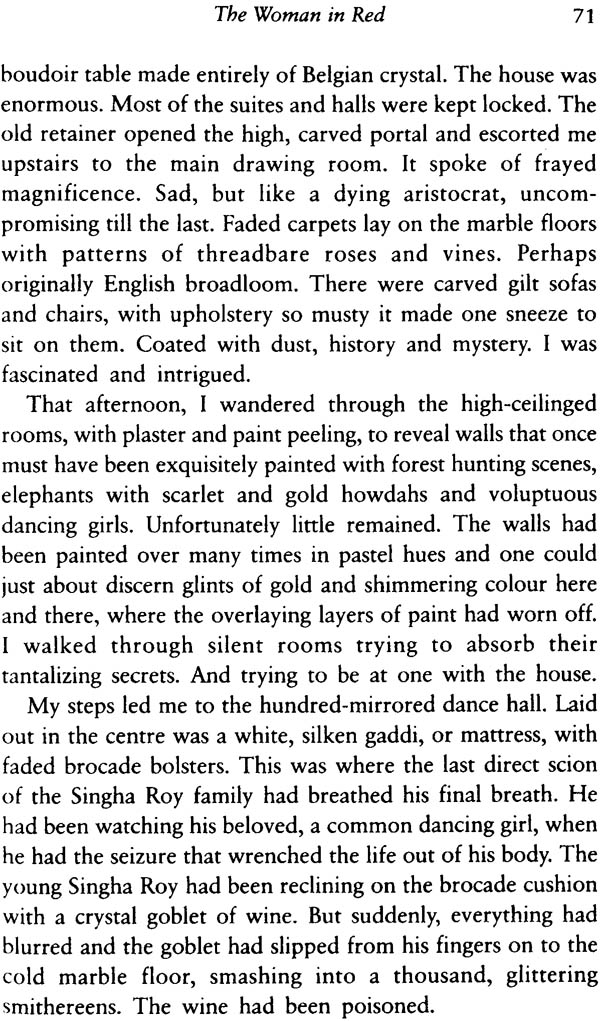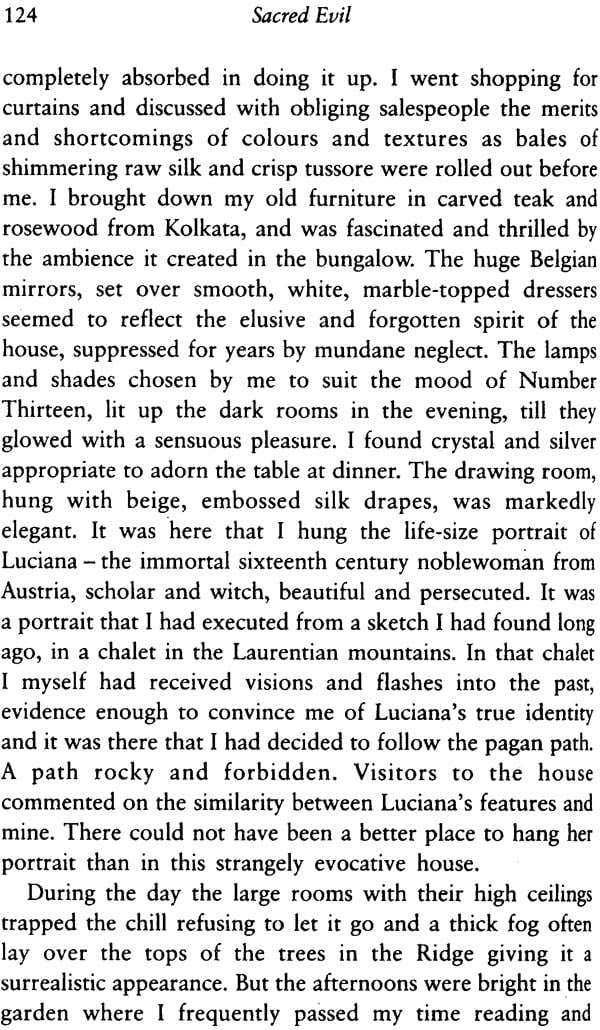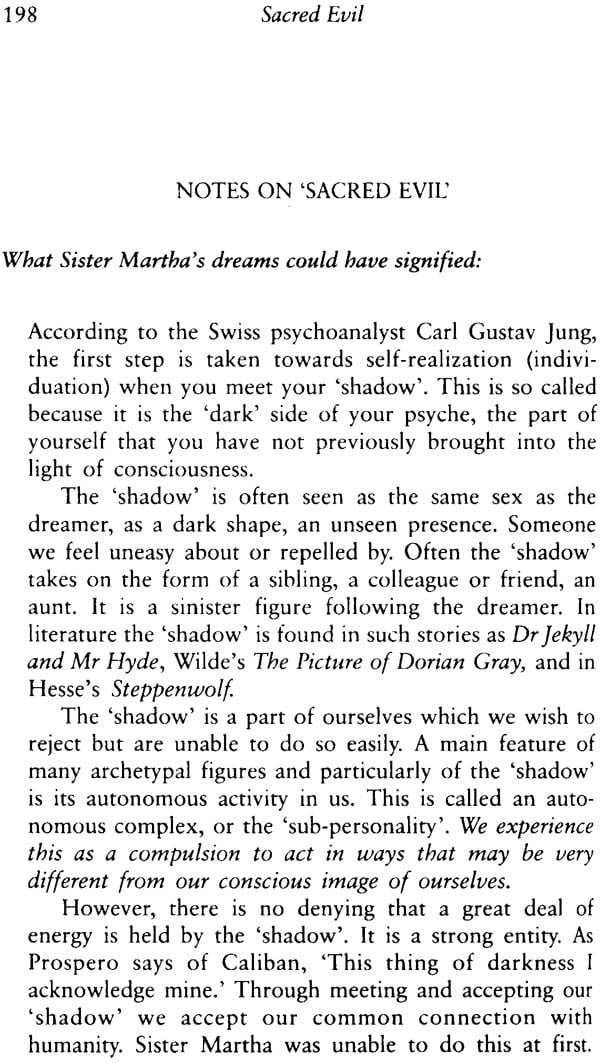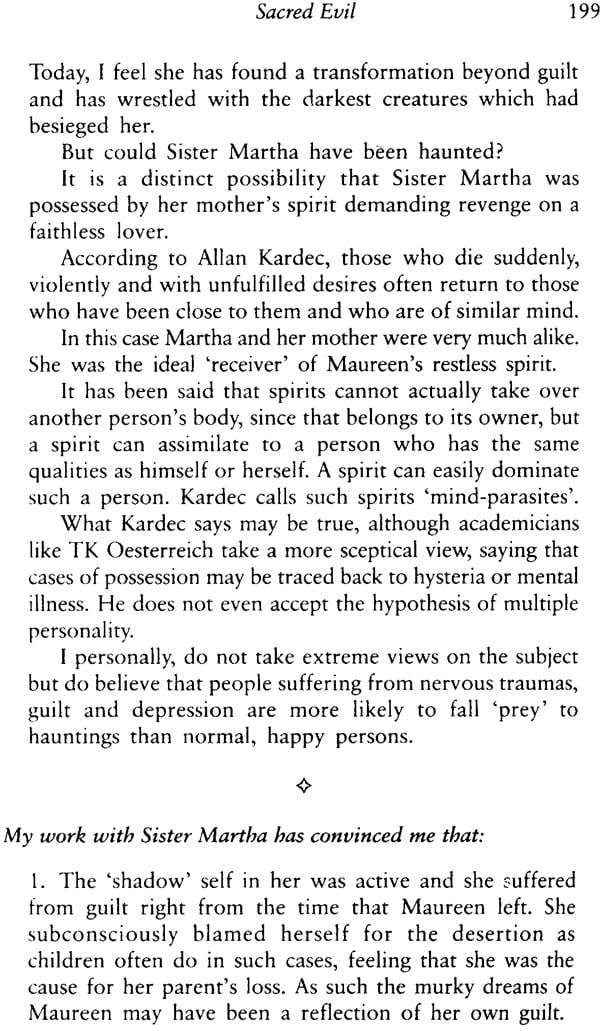
Sacred Evil (Encounters With The Unknown)
Book Specification
| Item Code: | NAG443 |
| Author: | Ipsita Roy Chakraverti |
| Publisher: | Harper Collins Publishers |
| Language: | English |
| Edition: | 2009 |
| ISBN: | 9788172234522 |
| Pages: | 200 |
| Cover: | Paperback |
| Other Details | 8 inch X 5 inch |
| Weight | 190 gm |
Book Description
About the Author
Enchantress and author, Ipsita Roy Chakraverti, an adept at both the western witchcraft tradition, as well as the Indian science of Dakini Vidya, presents nine true encounters, laced with the powers of light and darkness, that look beyond the limited reality of the manifest, to the finer realities of the soul and spirit. Based on real-life stories of people who, troubled by forces and events they cannot comprehend, have sought her out through her many years as a practitioner and scholar of the occult, these incidents - involving mystic-saints, necromancers, zombies, Tantrics, and restless spirits- are an analytical and lucid presentation of otherworldly phenomena. Through them, the author gives us a tantalizing glimpse of a deeper, darker, infinitely more complex, world. And gently mocks our limited perception of it.
Ipsita Roy Chakraverti was born in Kolkata. She went to college in Montreal, Canada, where, apart from graduating with Honours in English Literature, she became a member of the Society of the Study of Ancient Cultures and Civilizations and studied the myths, legends and esoteric history of old world cultures, before choosing the study of Wicca as her true calling. Her bestselling book, Beloved Witch was published in 2000. At present she is Secretary of the West Bengal Pradesh Congress Committee, in charge of women's affairs and the under-developed areas of Bengal.
Preface
AT HEART I AM A SCEPTIC. I FIND IT HARD TO BELIEVE IN WHAT I don't see and feel and hear. I need the proof of my senses. People who don't like me - and in that category, there are plenty - call me hard and cynical. Of course by no means am I abrasive and loud. I suppose you would call me quietly stubborn. The lip that sneers rather than the voice that howls. I hold my own views quietly. But I hold them with a certain measure of arrogance.
At school, in Montreal, Canada, I excelled in mathematics and physics. In college I fell in love with English literature and graduated with honours in that subject. I also took up the study of political science and it seems was interested enough in it to enter politics in India, at a later time in my career. I entered the political milieu because I thought I might as well find out about it at first hand. I had already been called upon umpteen times to advise heads of state and prime ministers. Mind you, I am no astrologer. Neither am I a fortune-teller. It's just that in India, if one is versed in the Yogic secrets and in Wicca, as I am, one is much in demand by politicians. That is all. I say this with no great arrogance because sometimes it is a nuisance. Also, I have a downright horror of being considered a 'godwoman'. However, there was another reason for my entering politics. I found the challenges and the changing face of the Indian scenario most invigorating. In 1998 I was asked to stand for the General Elections from Hooghly in West Bengal on a Congress ticket. I suppose it was because my family was well known in Bengal or it may be because the. party needed candidates who were not afraid to risk their necks in dangerous waters. Hooghly is a CPI(M) stronghold and I lost. But I had a marvellous time campaigning and I was convinced the common people loved me and needed me and thus I started an NGO called The National Youth Brigade in Hooghly which would give a voice to youth and lools after the needs of children - no matter what the political affiliations of their parents. Some people called me whimsical. Others read deep, dark motives into my actions. Some said I was as shrewd and cunning as they come. I laughed.
I bought a piece of land there and started growing vegetables. The soil was dark and soft and the Hooghly grew wonderful potatoes. I dug for them at harvest time and felt them rough and sturdy in my hands They tasted like no other potato I had ever had. They were the ambrosia of the earth.
But I had been hearing about disturbing things happening in the rural areas of certain states of India. A certain village Adivasi girl told me that some miles away in Dhaniakhali, in Hooghly, a sister of hers had been branded a witch. Her inquisition by the village elders was to take place within the week. She was to travel to the place of trial at her own cost. If she was found guilty of having practised the black arts, she was to be physically punished or worse. At any rate she was to pay a heavy fine of twelve hundred rupees. For a poor village family that was tantamount to a fortune. Such is the state of women in our country today. This poor person had been accused of being a shape shifter. Her neighbours claimed that on warm summer nights they had seen her turn into a dark, hairy, wolf-like creature and prey on her neighbours' children. I believe a child had recently died of some unspecified disease - which could have been anything from flu to malaria. However, these kind villagers had sworn it was this poor woman who had sucked the blood from the child at night. They had seen her. They insisted that when they had gone to hunt her down she had fled and returned in the morning in her human form.
We are truly back in the Middle Ages. I sent out my workers to talk to the local Officer in Charge at the police station and talked to the Village Panchayat. I threatened to take action against them. Some of the men were furious. A few promised me that I would not live to see another day. But the harassment of the woman stopped. She was not called to trial. However, her neighbours still looked upon this poor, childless woman with suspicion and she and her husband were ostracized. Her sister told me that they had decided to move to another district in Bengal. I advised them against it. I believed that that would be running away. I have never advocated running away from any situation. Out- staring a person or situation is a pretty good strategy, which I have followed all my life. It worked for them. Soon after this, other women, battered and bruised, suffering degradation at the hands of men or society, started coming to me for help in one form or another. They said they found strength here. I became a counselling centre and an advisor. I started touring the districts with certain investigative agencies trying to find, if not root out, the causes for atrocities against women in our country.
I had suddenly become a champion of the underdog. I was also fast becoming a champion of all women branded 'witches'. The strange thing is, that I, who wasn't really much moved by anyone or anything in life, really felt angry at the hypocrisy of Indian society, which on one hand worshipped the Goddess as Mother, and on the other hand killed a woman as 'witch'.
Maybe I was just a well-bred dilettante with a bit of blue blood in my veins. And we are reminded that such a breed never really develops much purpose in life. Long ago I had proved that point, when after graduating from college, I started painting canvas after canvas, completely on a whim. I also read and researched the works of Oscar Wilde. I was fascinated by his genius and my own. I worked with artists of distinction both in India and abroad. They were my teachers. I was given a few awards for my pains. They said I had an excellent sense of colour. I even sold some paintings at a good price and squandered the money on things and people I can't even remember now.
But there was something in my life that was unchanging and a part of me. Something I had taken an interest in years back would often come back to haunt me. I suppose 'haunt' is an appropriate word here. A long time ago, I had developed a passion for metaphysics. In modern parlance, I suppose you could call it the esoteric, the mystical. In Montreal, Canada, when I was still in my teens, I had been made the first Indian member of the Society for the Study of Ancient Cultures and Civilizations. There, I had received a good amount of grounding in the myths, legends and esoteric history of old world cultures. I became trained and disciplined in the ways of a pagan monastic. Our limited group of erudite teachers and a few initiates were housed over weekends and on certain old world holidays, in an exquisite, wooden chalet in the heart of the' Laurentian Mountains. On weekdays, I carried on with my more conventional academic pursuits. Now, here comes the interesting part. After a few years of this most unusual yet fascinating way of life, I was asked by my guides what I would choose to specialize in. The years of general study were over. The years of poring over tomes of old knowledge and dusty manuscripts. I said I was drawn to the study of Wicca or Witchcraft - as it was later called, by those who decided to burn women at the stakes. Something, in that chalet, amidst the woods, had prompted me to delve deeper into the subject. My head teacher was a bit hesitant. She wondered how my country would react to a woman who one day might choose to be called a 'witch'. I said I was determined to follow that path. And so it was decided. We shook hands over it. But a Higher Power looked on. I am convinced about it. I seemed to be the chosen one.
On returning to my own country I carried on with my research into Dakini Vidya as the subject was called in India, a long time ago, as far back as the Eleventh century. I was convinced this was the first Feminist Movement in history. At one time women known as yoginis in eastern India, had come forward and said that the true 'Shakti' was within them as women. This was also the beginning of the gender war. But Wicca, or Dakini Vidya was more than that. It carried far flung historical and sociological meaning. Also buried within it were the myths and archetypes which made up the human consciousness. This was from where started modern psychoanalysis and psychiatry. At the chalet we had studied a great deal of the works of Carl Gustav Jung. As a Wiccan, I was taught and trained in healing the travails of the human mind. I carried on my reading back in India, and came to my own conclusions about the workings of the mind and the spirit.
Dakini Vidya believes in aligning with certain external powers. Within crumbling ruins of old temples and sacred power spots in India, I spent long days experimenting. I used instruments to measure magnetic fields and special cameras to capture unexplained phenomena. I wanted to analyse. Belief could come later.
In Calcutta I spent some years putting into practice what I had learned at the chalet. I was a trained Jungian psychologist by now and versed in the ways of Wiccan therapy. People in need wanted to try this new branch of therapy and I found that more than ninety per cent of those coming to me profited. I was starting to believe that there was more to life than conventional science. Many also came to me wanting to relate strange experiences they had had. Experiences that could not be explained away with ordinary rationality. I listened. I tried to understand and realized what Jung had said about the Shadow Self in man. I also tried to accept the fact that there really was more to life than the five senses.
Where the concept of good and evil was concerned, I thought and read and observed. So many minds, so many views. There is so much we do which should not be done and there is so much we leave undone. At the end, one goes on gathering what the world calls 'knowledge' but the questions remain unanswered. Perhaps that is the way it was meant to be. I am willing to let certain enigmas rest. But a mind that quests and searches cannot be fully tamed into disciplined obedience.
I for one, want to see a little bit more of what lies beyond the bend of that road, I want to glimpse that face behind the veil. I know for a certainty that there is more to existence than what the senses perceive. I do not plunge into the dusk blindly. I tread cautiously. I stand back and watch. I try to understand. And what I see and hear mystifies me.
A long time ago, when I became a Wiccan, my teacher, Carlotta, had thrown an exquisite black velvet cloak round my shoulders.
'Ipsita,' she had said, 'Wear this cape and know its true meaning. This is the cape of Athena. She who was the Goddess of Wisdom. She who was named Minerva in ancient Rome, and presided over strategy in wartime and the domestic arts in peacetime ... this cape symbolizes the armour you must wear. Surround and protect yourself with the inscrutability of midnight. Know the worth of dignity and the need to stand aloof from the world.'
Today, I think of Carlotta and what she had said. Midnight has its own beauty. Maybe from the darkness comes the truth.
Why have I called this book 'Sacred Evil'? Plato said, 'From madness Greece has derived its greatest benefits.' If that is so, can we not say that often from evil comes the greatest good? Or is it the other way around? I really want to know. Has the most grievous sorrow risen like a restless wraith from what the world calls 'sacred'?
I have written about nine true encounters with the strange.
They are taken from my case files and I have merely changed a few names. They are laced with the powers of light and darkness. Enjoy the dark.
Contents
| Preface | 9 |
| The Loving Doll | 17 |
| The Coconut | 45 |
| The Woman in Red | 61 |
| The Rickshaw-Puller | 79 |
| The Goddess | 95 |
| Bungalow Number Thirteen | 119 |
| The Tree | 139 |
| Those Who Return | 151 |
| Sacred Evil | 169 |
